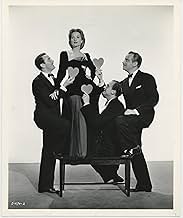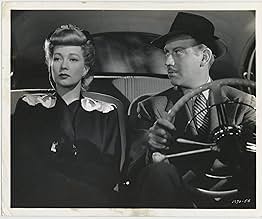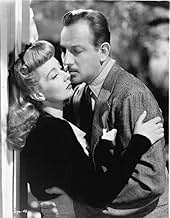Aggiungi una trama nella tua linguaWorld War II home front romantic comedy in which a war correspondent's wife wants a divorce along with his help in choosing her next husband.World War II home front romantic comedy in which a war correspondent's wife wants a divorce along with his help in choosing her next husband.World War II home front romantic comedy in which a war correspondent's wife wants a divorce along with his help in choosing her next husband.
Ernie Alexander
- Daily Globe Staff Member
- (non citato nei titoli originali)
Elvia Allman
- Eva
- (non citato nei titoli originali)
Hooper Atchley
- Reporter at Army Concert Hall
- (non citato nei titoli originali)
King Baggot
- Daily Globe Staff Member
- (non citato nei titoli originali)
Arthur Belasco
- Reporter
- (non citato nei titoli originali)
Mary Benoit
- Musician
- (non citato nei titoli originali)
Rudolph Cameron
- Reporter
- (non citato nei titoli originali)
Chester Clute
- Man with Binoculars
- (non citato nei titoli originali)
Phyllis Cook
- Western Union Girl
- (non citato nei titoli originali)
Nell Craig
- Maid
- (non citato nei titoli originali)
Recensioni in evidenza
"Three Hearts For Julia" is another World War II romantic comedy at home. Jeff Seabrook is a war correspondent who is currently divorcing his wife. His wife, a talented violinist, wants a more sophisticated husband. He has two acceptable suitors and wants Jeff (whom he considers his best friend) to help him decide between them. David Torrance - orchestra producer and Philip Barrows - music critic. Meanwhile, Julia gets paternal advice from her conductor, Anton Ottoway, who has become good friends with Jeff.
Did you love the 1940 comedy Third Finger, Left Hand? Are you looking for something extremely similar to watch on a rainy afternoon? Look no further than Three Hearts for Julia, another romantic comedy starring Melvyn Douglas, and backed by Lee Bowman and Felix Bressart. In this one, Mel makes a surprise entrance upon his female companion, who is an ardent career woman, and has to compete against Lee, who's been making headway during his absence, and ultimately receives some sage advice from Felix, the funny foreigner who's wiser than he seems. Sound familiar? There are very few differences between the two movies, so it's a sure bet if you liked one, you'll like the other.
In place of Myrna Loy, Ann Sothern is Mel's abandoned wife, who's focused on her career as a violinist in an orchestra while he's been an overseas war reporter. Lee Bowman is given just as little character development as before, but merely serves as a rival suitor. Felix plays a Hungarian conductor, brought in as a special guest, who ends up giving marital advice to both Ann and Mel. While I love his hidden talents brought forth in many of his movies, Felix shows off his musical skills in Three Hearts for Julia. A doctor, multilingual, a dramatic and comedic actor, and now a musician! Most of the orchestral scenes show Felix up close, and he nails his conducting in every shot.
If you like Mel's comic timing, Ann's charming insecurity, or movies that feature large swatches of classical music, rent this one. It's pretty good, and no one knows about it so you can be the first to spread it around to your friends.
In place of Myrna Loy, Ann Sothern is Mel's abandoned wife, who's focused on her career as a violinist in an orchestra while he's been an overseas war reporter. Lee Bowman is given just as little character development as before, but merely serves as a rival suitor. Felix plays a Hungarian conductor, brought in as a special guest, who ends up giving marital advice to both Ann and Mel. While I love his hidden talents brought forth in many of his movies, Felix shows off his musical skills in Three Hearts for Julia. A doctor, multilingual, a dramatic and comedic actor, and now a musician! Most of the orchestral scenes show Felix up close, and he nails his conducting in every shot.
If you like Mel's comic timing, Ann's charming insecurity, or movies that feature large swatches of classical music, rent this one. It's pretty good, and no one knows about it so you can be the first to spread it around to your friends.
Based on a preview of the cast, I eagerly anticipated this movie, which I had not seen before. I really love films from the '30's to the late '40's. But this movie was a big disappointment. However, I do not fault the cast. Melvyn Douglas is among my all-time faves, and I also like Ann Sothern very much. The problem is not with the actors, but with their characters.
The writer doesn't provide sympathetic characters from the outset of the movie. Douglas apparently abandons his wife frequently and for long periods to pursue his writing career. At the beginning of the movie he is returning home, although he doesn't seem sincere about trying to reconstruct his marriage. He seems like he is coming home for another respite (and to placate his wife) before taking off again.
Ann Sothern, the abandoned wife, never really establishes herself as the wronged woman. She has re-launched her career, hooked 2 new suitors and seems set to begin her new life. She doesn't seem to be very emotionally accessible to any of the 3 men in her life OR to us, the audience. Why should we care if this estranged couple gets back together?
Even Felix Bressart, another favorite character actor, is not good here. He seems more goofy than eccentric. His acting is quite a comedic contrast to the remainder of the rather understated performances. It seems a little out of place here.
The humor, as one commentator has noted, is not only predictable, but also based on sexual stereotypes, which I suspect were no more humorous in the day of Rosie the Riveter than they are today. Its only real purpose is to allow Bressart to reflect on how much better his problems are in America than they would be in Europe. The tragic truth in those observations deprives them of much humor.
Despite the unflattering stereotypes, I felt very ambivalent toward the female orchestra members. They are not particularly entertaining or sympathetic. Spending a night at Sothern's house, they all seem to forget they are actually guests in a home that is Douglas' too.
I found myself gradually warming to the characters of Douglas and Sothern. But for a movie to be really engaging, I need to connect with characters early in a film, not gradually begin to warm to them when the movie is half over. That was the real killer for this movie. The predictability and the trite sexism were just additional nails in the coffin. What a disappointment!
The writer doesn't provide sympathetic characters from the outset of the movie. Douglas apparently abandons his wife frequently and for long periods to pursue his writing career. At the beginning of the movie he is returning home, although he doesn't seem sincere about trying to reconstruct his marriage. He seems like he is coming home for another respite (and to placate his wife) before taking off again.
Ann Sothern, the abandoned wife, never really establishes herself as the wronged woman. She has re-launched her career, hooked 2 new suitors and seems set to begin her new life. She doesn't seem to be very emotionally accessible to any of the 3 men in her life OR to us, the audience. Why should we care if this estranged couple gets back together?
Even Felix Bressart, another favorite character actor, is not good here. He seems more goofy than eccentric. His acting is quite a comedic contrast to the remainder of the rather understated performances. It seems a little out of place here.
The humor, as one commentator has noted, is not only predictable, but also based on sexual stereotypes, which I suspect were no more humorous in the day of Rosie the Riveter than they are today. Its only real purpose is to allow Bressart to reflect on how much better his problems are in America than they would be in Europe. The tragic truth in those observations deprives them of much humor.
Despite the unflattering stereotypes, I felt very ambivalent toward the female orchestra members. They are not particularly entertaining or sympathetic. Spending a night at Sothern's house, they all seem to forget they are actually guests in a home that is Douglas' too.
I found myself gradually warming to the characters of Douglas and Sothern. But for a movie to be really engaging, I need to connect with characters early in a film, not gradually begin to warm to them when the movie is half over. That was the real killer for this movie. The predictability and the trite sexism were just additional nails in the coffin. What a disappointment!
This overwritten screwball comedy tries to go in far too many directions at once and, like a centipede asked to demonstrate how it walks, keeps falling over itself.
Although MGM's brilliant lighting and lavish budgets could save many a drama, a comedy depends on good writing and performers. Here you have good performers with Ann Southern, Melvyn Douglas and Felix Bressart in, essentially the third lead. But it seems to have escaped anyone that you know as soon as Douglas begins to speak, in the first scene of his having neglected his marriage, that this movie would be about the recourting of his wife. When was the last time a romantic comedy had anything new in the way of plot points? About twenty years before Plautus was born is my guess. What matters is the jokes and the performers, and the jokes here are few and feeble. Instead we are distracted by a plethora of side issues, including a rather poor attempt to create a Aaron Copland style of score.
Director Richard Thorpe is often criticized for his stolid handling of stolid stars in stolid subjects for MGM -- here was a man who, in his Poverty Row days could turn out something sprightly, silly and cheap like UNDER MONTANA SKIES and WINGS OF ADVENTURE. But his ability to shoot decent stuff less expensively than some of his more fabled fellow directors got him assignments like IVANHOE with Robert Taylor, and what was he supposed to do with something like that other than get an adequate performance out of Robert Taylor on schedule? He can't manage much here, either.
Although MGM's brilliant lighting and lavish budgets could save many a drama, a comedy depends on good writing and performers. Here you have good performers with Ann Southern, Melvyn Douglas and Felix Bressart in, essentially the third lead. But it seems to have escaped anyone that you know as soon as Douglas begins to speak, in the first scene of his having neglected his marriage, that this movie would be about the recourting of his wife. When was the last time a romantic comedy had anything new in the way of plot points? About twenty years before Plautus was born is my guess. What matters is the jokes and the performers, and the jokes here are few and feeble. Instead we are distracted by a plethora of side issues, including a rather poor attempt to create a Aaron Copland style of score.
Director Richard Thorpe is often criticized for his stolid handling of stolid stars in stolid subjects for MGM -- here was a man who, in his Poverty Row days could turn out something sprightly, silly and cheap like UNDER MONTANA SKIES and WINGS OF ADVENTURE. But his ability to shoot decent stuff less expensively than some of his more fabled fellow directors got him assignments like IVANHOE with Robert Taylor, and what was he supposed to do with something like that other than get an adequate performance out of Robert Taylor on schedule? He can't manage much here, either.
"Three Hearts for Julia" from 1943 was intended, I believe, to be a screwball comedy. It isn't. It isn't really a light comedy, either, as it's kind of heavy-handed for such a fluffy script.
It stars people who normally could pull off anything: Melvyn Douglas, Ann Sothern, Felix Bressart, Lee Bowman, and Reginald Owen. But you need a stronger script and a director with a flare for comedy.
This is a WW II story about a war correspondent, Jeff (Douglas) who is home at last, only to find his wife (Sothern) wants a divorce. She is a talented musician who is in a woman's orchestra and wants more out of life. He's away too much and preoccupied with his work.
She has two suitors who can't wait for her to be divorced. One is David Torrance, the orchestra's producer (Bowman), and Philip Barrows (Ainley), a music critic. Because she values his opinion, she asks Jeff to help her choose. Jeff has chosen - himself! Some mild humor and good music with one faux pas. The orchestra plays Wagner which during WWII in this country was verboten. So verboten that no Wagner was performed at the Metropolitan Opera and his music was removed from operatic aria compilations. Highly doubtful a European conductor (Felix Bressart) who was glad to be alive would have conducted it.
On the dull side, with good performances, but ultimately a disappointment.
It stars people who normally could pull off anything: Melvyn Douglas, Ann Sothern, Felix Bressart, Lee Bowman, and Reginald Owen. But you need a stronger script and a director with a flare for comedy.
This is a WW II story about a war correspondent, Jeff (Douglas) who is home at last, only to find his wife (Sothern) wants a divorce. She is a talented musician who is in a woman's orchestra and wants more out of life. He's away too much and preoccupied with his work.
She has two suitors who can't wait for her to be divorced. One is David Torrance, the orchestra's producer (Bowman), and Philip Barrows (Ainley), a music critic. Because she values his opinion, she asks Jeff to help her choose. Jeff has chosen - himself! Some mild humor and good music with one faux pas. The orchestra plays Wagner which during WWII in this country was verboten. So verboten that no Wagner was performed at the Metropolitan Opera and his music was removed from operatic aria compilations. Highly doubtful a European conductor (Felix Bressart) who was glad to be alive would have conducted it.
On the dull side, with good performances, but ultimately a disappointment.
Lo sapevi?
- QuizJoan Crawford was offered the lead role, but turned it down.
- BlooperMelvyn Douglas is shown playing a musical saw by kind of strumming it or rubbing it with his bare hand. People actually play a saw by bowing it with a violin bow.
I più visti
Accedi per valutare e creare un elenco di titoli salvati per ottenere consigli personalizzati
Dettagli
- Tempo di esecuzione1 ora 23 minuti
- Colore
- Proporzioni
- 1.37 : 1
Contribuisci a questa pagina
Suggerisci una modifica o aggiungi i contenuti mancanti

Divario superiore
By what name was Three Hearts for Julia (1943) officially released in India in English?
Rispondi





















